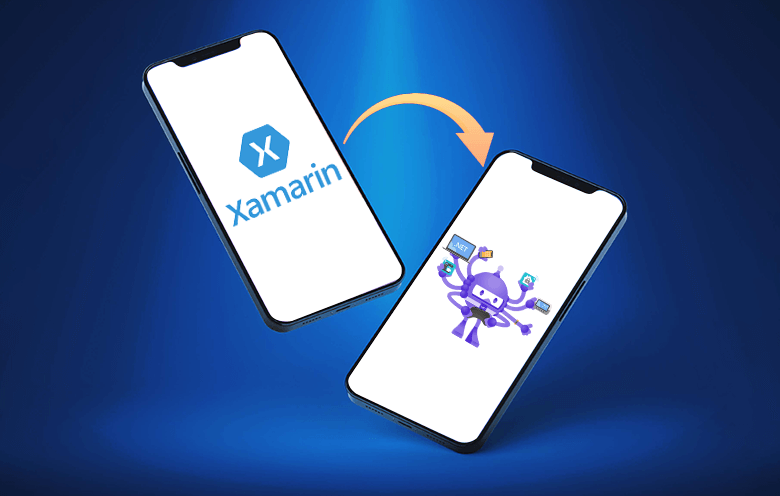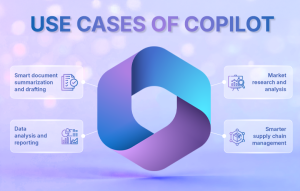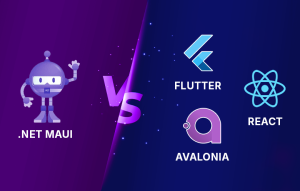Xamarin is a cross-platform development platform that allows developers to build native mobile apps for Android, iOS, and Windows using C#. It was first released in 2011 and has been used by a wide range of developers to create apps for a variety of businesses and organizations.
Microsoft has announced that support for Xamarin will end on May 1, 2024. This means that after this date, Microsoft will no longer provide bug fixes, security updates, or new features for Xamarin. If you are still using Xamarin after May 1, 2024, your apps may not be able to run on the latest versions of Android and iOS.
If you are planning to continue using Xamarin, you should think of migrating to .NET MAUI (Xamarin.UI) as soon as possible. MAUI (Multi-platform App UI) is the successor to Xamarin.
Why should you migrate to .NET MAUI?
.NET MAUI is the future of cross-platform development. It is the latest and greatest cross-platform development platform from Microsoft. It is built on .NET 6, the latest version of the .NET framework, and it offers several advantages over Xamarin.
Microsoft is committed to supporting .NET MAUI for many years to come. This means that you can be confident that your apps will be supported and updated in the future.
.NET MAUI is an open-source project, which means that it is more accessible to developers and has a larger community of support. This can be helpful if you need help with your app or if you want to contribute to the project.
Microsoft has made it easy to migrate Xamarin apps to .NET MAUI. There are many tools and resources available to help you with the migration process.
Benefits of Xamarin to .NET MAUI migration
- Single project framework: .NET MAUI apps can be built using a single project, which can make the development process more streamlined. Xamarin apps, on the other hand, require separate projects for each platform.
- More modern features: MAUI includes new features that make it more modern and powerful, such as support for custom renderers and native controls.
- Reduced maintenance costs: .NET MAUI is a newer framework than Xamarin, so it is less likely to have bugs or security vulnerabilities. This can help reduce the cost of maintaining your apps.
- Improved performance: .NET MAUI is built on .NET 6, which is a more modern and efficient framework than Xamarin. This can lead to improved performance for your apps.
- Better developer experience: .NET MAUI offers several improvements over Xamarin, such as better tooling and documentation. This can make the development process more enjoyable and productive.
Key features of .NET MAUI
- Cross-platform UI: .NET MAUI uses a single UI framework for all platforms. This means that you can write your UI code once and have it work on all platforms.
- Native performance: .NET MAUI apps can achieve native performance on all platforms. This means that your apps will feel and behave like native apps, regardless of the platform they are running on.
- Multi-platform support: .NET MAUI supports building apps for Android, iOS, macOS, Windows and tvOS. This means that you can build a single app that can run on all these platforms.
How to upgrade Xamarin apps to .NET MAUI?
There are two ways to migrate from Xamarin to .NET MAUI:
Manual migration
This involves manually migrating your Xamarin code to .NET MAUI. This can be a time-consuming process, but it gives you the most control over the migration.
Automatic migration
There are several tools available that can help you automatically migrate your Xamarin code to .NET MAUI. These tools can save you time, but they may not be able to migrate all your code.
How does Softweb Solutions ensure a smooth Xamarin to MAUI migration?
Softweb Solutions has a team of experienced developers who can help you with the migration of your Xamarin apps to .NET MAUI.
- Identify the changes that need to be made to your code: Our team of experienced engineers is familiar with both Xamarin and .NET MAUI. We can help you identify the changes that need to be made to your code to migrate it to the new framework.
- Create a new .NET MAUI project: We help you create a new .NET MAUI project for your app. This can be a helpful step if you are not familiar with .NET MAUI or if you need help getting started.
- Migrate your code to the new project: We start migrating your code to the new .NET MAUI project. This can be a challenging task, and we can help you ensure that the migration is done correctly.
- Test your migrated code to make sure it works correctly: We test your migrated code to make sure it works correctly. This is a key step to ensure that your app works as expected after the migration.
- Guidance and support throughout the migration process: This can be helpful if you are not familiar with .NET MAUI or if you need help making decisions about the migration.
Migrate from Xamarin to MAUI now!
Migrating from Xamarin to .NET MAUI can be a daunting task, but it can be worth it in the long run. If you are considering migrating your Xamarin apps to .NET MAUI, we recommend that you start by creating a migration plan and testing your apps thoroughly after the migration.
If you are not familiar with .NET MAUI or if you are not sure how to migrate your apps, you may want to consider seeking help from a third party. Softweb Solutions can help you with all aspects of the migration process, from identifying the changes that need to be made to your code to testing your migrated code to make sure it works correctly. To learn more about .NET MAUI consulting services, please talk to our experts.









